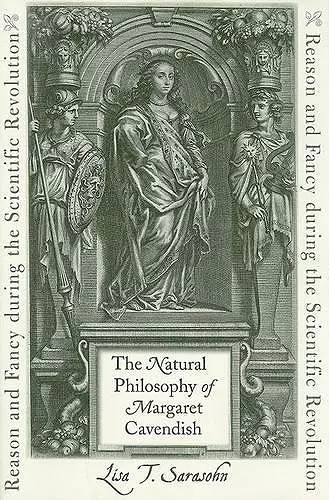The Natural Philosophy of Margaret Cavendish
Reason and Fancy during the Scientific Revolution
Format:Hardback
Publisher:Johns Hopkins University Press
Published:18th May '10
Currently unavailable, our supplier has not provided us a restock date

The most thorough and convincing analysis of Cavendish's natural philosophy to date. -- Hilda L. Smith, University of Cincinnati
It not only celebrates Cavendish as a true figure of the scientific age but contributes to a broader understanding of the contested nature of the scientific revolution.Margaret Cavendish, Duchess of Newcastle, led a remarkable-and controversial-life, writing poetry and prose and philosophizing on the natural world at a time when women were denied any means of a formal education. Lisa T. Sarasohn acutely examines the brilliant work of this untrained mind and explores the unorthodox development of her natural philosophy. Cavendish wrote copiously on such wide-ranging topics as gender, power, manners, scientific method, and animal rationality. The first woman to publish her own natural philosophy, Cavendish was not afraid to challenge the new science and even ridiculed the mission of the Royal Society. Her philosophy reflected popular culture and engaged with the most radical philosophies of her age. To understand Cavendish's scientific thought, Sarasohn explains, is to understand the reception of new knowledge through both insider and outsider perspectives in early modern England. In close readings of Cavendish's writings-poetry, treatises, stories, plays, romances, and letters-Sarasohn explores the fantastic and gendered elements of her natural philosophy. Cavendish saw knowledge as a continuum between reason and fancy, and her work integrated imaginative speculation and physical science. Because she was denied the university education available to her male counterparts, she embraced an epistemology that favored contemplation and intuition over logic and empiricism. The Natural Philosophy of Margaret Cavendish serves as a guide to the unusual and complex philosophy of one of the seventeenth century's most intriguing minds. It not only celebrates Cavendish as a true figure of the scientific age but also contributes to a broader understanding of the contested nature of the scientific revolution.
A useful addition to the canon of critical work on the scientific revolution. Choice 2010 A welcome addition to early modern philosophy courses, in which women are often entirely absent or subordinated. Using Cavendish and Sarasohn's book will lead to very interesting discussions about the role of women in science and society in the early modern period. -- Benjamin Goldberg HOPOS: The Journal of the International Society for the History of Philosophy of Science 2011
ISBN: 9780801894435
Dimensions: 229mm x 152mm x 23mm
Weight: 499g
272 pages